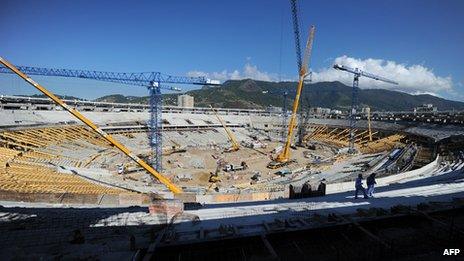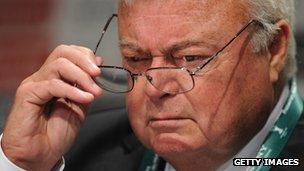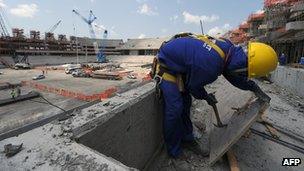Is Brazil ready to host the 2014 World Cup?
- Published

It is only two years until Brazil hosts the 2014 Fifa World Cup. But is the country ready? The BBC's Brazil-based football writer Tim Vickery investigates.
Fifa Secretary General Jerome Valcke recently declared that preparations for the 2014 World Cup in Brazil were moving forward on cruise control.
But he is well aware that it has been a bumpy ride.
Indeed, only a few months ago, Mr Valcke set off a diplomatic incident when he said that Brazil needed "a kick up the backside" to speed things up.
Brazilians are notoriously sensitive about criticism from outsiders. But even if the choice of words was unwise, then there is widespread agreement amongst Brazilians about the sentiment behind them.
The president of an association of architects and engineers, Jose Roberto Bernasconi, has often voiced his frustration over the slow progress. In an article published in September in Brazil's sports daily Lance!, he said he feared poor planning could lead to a wasted opportunity. Early last year he put his finger on the problem.
"There are countries which suffer natural disasters and need to reconstruct everything on an emergency basis," he said. "We create our own emergencies without any need to."
In effect Brazil knew it would be hosting the World Cup as far back as March 2003. Then, Fifa president Sepp Blatter announced that under the principle of rotating the tournament round the various continents, 2014 would be South America's turn.
Conmebol, South America's football confederation, almost instantly declared Brazil the only candidate; Colombia later briefly ran its own bid, but without the slightest chance of success.
So in October 2007, when Brazil were officially announced as 2014 hosts, it might have been expected plans would be finalised - or at the very least that host cities had been chosen. None of this had happened.
And it got worse. Brazil would not choose its host cities - Fifa would. They finally made public their decision at the end of May 2009.
Confused process
The countries who bid to stage subsequent World Cups - in 2018 and 2022 - were all made to draw up detailed plans just to enter the contest. Brazil, though, was given a free pass. Removing the discipline of competition opened the door to what could be called some of the more depressing aspects of Brazilian society.
Ricardo Teixeira, president of the CBF (Brazil's football association) from 1989 until March of this year has been one figure blamed for the confusion. In March, with a corruption story about to break, he resigned, and now resides in the US.

Ricardo Teixeira resigned in March, shortly before details of bribes were published
Aiming to keep things simple, Fifa had originally wanted to use eight cities. Mr Teixeira successfully lobbied for 12, because, it is believed, most states wanted to share in the glory of hosting World Cup games.
As well as running the CBF, he was the president of the Local Organising Committee - an unusual combination of roles. His decision was to push the selection process to Fifa, adding to delays.
Delays mean extra costs - costs the hard-pressed Brazilian taxpayer has to shoulder.
Back in October 2007 Mr Teixeira was adamant all the money used to build stadiums would be private.
Some of the stadiums may have limited long-term financial viability - especially true of those in Cuiaba and Manaus, with Brasilia and Natal also dubious, according to Brazilian financial newspaper BrazilEconomico. Now it appears much of thee money used on stadium work is coming from the public purse - as are the infrastructure improvements in 12 cities.
Presidential alliance
The government appeared to view this process with alarming passivity. For a long time there was no governmental representation on the Local Organising Committee, a marked difference from the previous World Cup in South Africa.
Even now Luis Fernandes from the Ministry of Sports only has observer status on the LOC. Previously the government seemed to treat the World Cup as a purely private affair - even though it would have to foot the bill.

The Brazilian taxpayer is expected to pick up most of the tab for constructing stadiums
Mr Teixeira enjoyed an alliance with Brazil's previous president Lula da Silva. Eager to be seen as a global statesman, Mr da Silva understood the Brazil national team was one of his biggest foreign policy assets. And since Mr Teixeira was the de facto "owner" of the team, an alliance made political sense.
Mr Teixeira sent the national team, stars and all, to play a friendly in August 2004 in Haiti, where Brazil head a United Nations force, while Mr da Silva gave him a free hand organising the World Cup.
Things changed at the start of last year when Mr da Silva gave way to President Dilma Rousseff. She appeared to have no time for Mr Teixeira, seemingly seeing him as a liability, and refused to meet him.
Under pressure, Mr Teixeira resigned. Corruption allegations were confirmed in Switzerland when it was announced he had taken 12.74m SFr (£8.4m) in bribes from sports marketing firm ISL, which handed out lucrative World Cup rights until it went bankrupt in 2001. These payments were not a criminal offence during the period when they were being made.
Damage limitation
Since Mr Teixeira's departure it has been much easier for Fifa, Brazil's government and the LOC to sit round a table and plan together.
But with so much time wasted, the goal now is damage limitation. The need for haste means stadiums will cost more than they should have, though at least they should be ready in time.
The World Cup could not happen without them; the same does not apply to urban transport projects, which would be Brazilian society's biggest gain from staging the tournament.
The World Cup is such a special event that fans are happy to arrive at the stadium hours early to drink in the atmosphere - a contrast to normal games, where people go to the match after work or following Sunday lunch.
Mr Bernasconi says less than 5% of funds for urban transport projects have been allocated - and with time running out, they are particularly vulnerable to cuts
Mr Valcke said in a press conference in June: "We can't think of creating a new country in five or six years. Maybe some of the projects are not so important to the World Cup. What we need, of course, are the stadiums. And we also need the airports to function well so that people can move around from one city to another."
Extra journeys
This has always been the Achilles heel of the 2014 World Cup. Experts such as Mr Bernasconi and the Instituto de Pesquisa Economica Aplicada (IPEA), a Brazilian research group, have long doubted Brazil's ability to make the necessary improvements to airport capacity in time.
Some of the airports have been privatised in a bid to beat the clock. In all 13 airports are receiving investments. The IPEA believes up to 10 of them will not be ready in 2014.
The organisers could have made things easier for themselves by reverting to the previous system of World Cup scheduling, where teams would play all of their group matches in a single region, reducing the number of journeys.
But this idea ran into a problem - it would give one region all of Brazil's group games. The whole country will want to see their team in action, and so Brazil will play their three group matches in three different regions.
And if they have to travel around, so will everyone else - though some will have to clock up more air miles than others. Will Brazil's airport infrastructure be able to cope? Come the end of the 2014 World Cup, Mr Valcke may not be the only one who has had a bumpy journey.
- Published17 August 2012
- Published10 August 2012
- Published28 June 2012
- Published12 June 2012
- Published9 May 2012
- Published12 March 2012